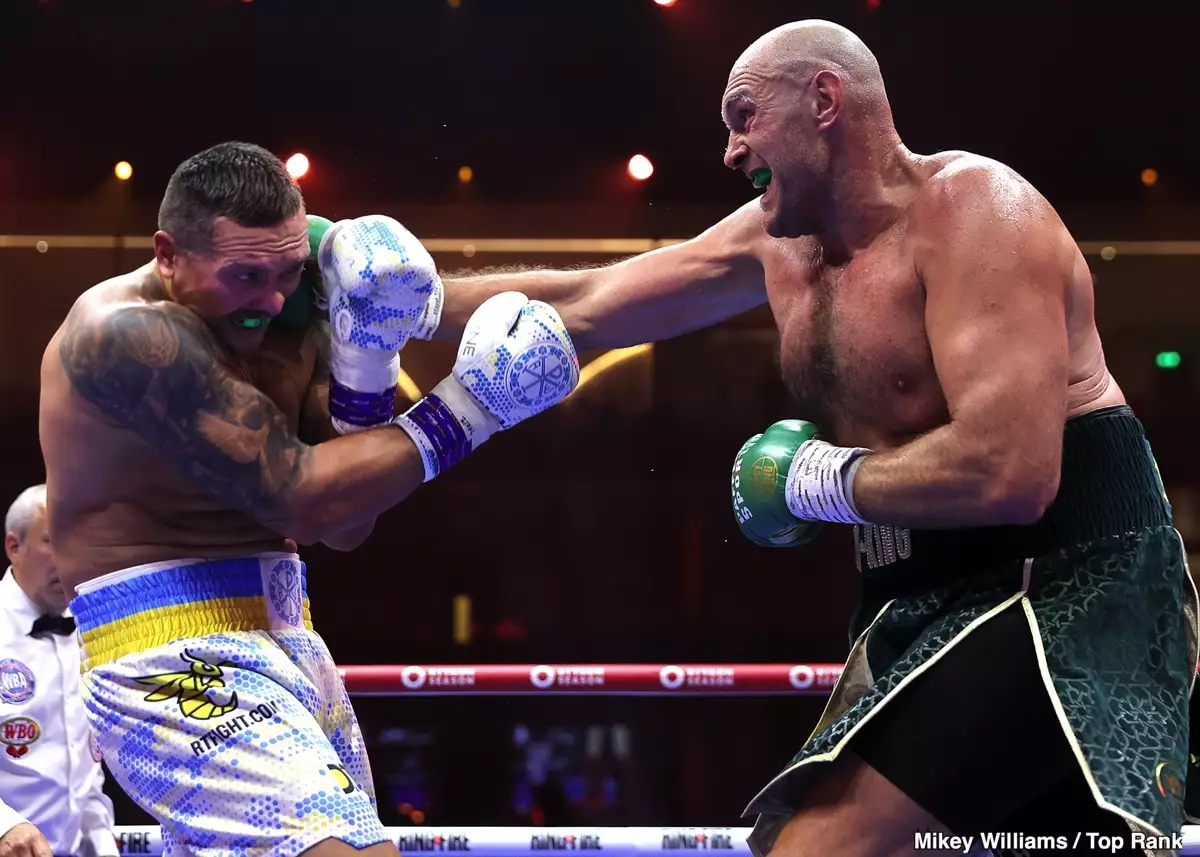The highly anticipated rematch between Tyson Fury and Oleksandr Usyk is set for December 21st, with bold claims emerging from Fury’s coach, Andy Lee. With an impressive record of 34 wins, 1 loss, and 1 draw, including 24 knockouts, Fury is seeking redemption after suffering a setback against Usyk in their last encounter. Lee fervently believes that Fury will emerge victorious this time around, stating that he will achieve the win through a knockout. This article aims to delve deeper into the nuances of Lee’s assertions and analyze the realities surrounding this heavyweight bout.
An essential element of Lee’s confidence in Fury lies in the latter’s preparation for the rematch. In the previous matchup, concerns arose regarding a cut that prevented Fury from engaging in effective sparring. Lee insists that the absence of sparring was detrimental to Fury’s performance, emphasizing that being fitter and having a comprehensive training camp will make a significant difference in Fury’s approach this time. The implication is clear: a well-prepared Fury would harness his physical attributes to counter Usyk’s skills.
Despite focusing on conditioning, it is crucial to point out that Fury’s loss to Usyk wasn’t solely a product of his fitness levels. There are deeper aspects in play, such as tactical execution and the ability to absorb punches. In an environment where punch resistance and strategic planning are vital, Fury will need to balance his conditioning with a comprehensive ability to adapt to Usyk’s boxing style.
Lee made a point of referencing Fury’s previous rematches where he emerged victorious by knockout against fighters such as Deontay Wilder, John McDermott, and Derek Chisora. However, this comparison carries limitations. None of these opponents are viewed as elite, world-class fighters akin to Usyk, who boasts an impressive skill set and boxing IQ. Fury’s past victories over mid-level competitors risk creating a false narrative about his knockout prowess. While Lee propagates the belief that Fury will rekindle his knockout magic against Usyk, one must question whether that assumption can be made if the opponent’s quality is not on par with those Fury has previously faced.
Furthermore, the nature of Wilder’s brief reign as the WBC champion reveals strategic matchmaking that raises questions about the legitimacy of his title defenses. The notion that Fury can simply replicate his past success against lesser opponents faces scrutiny when considering the caliber of his upcoming challenger.
Andy Lee expressed that he doesn’t perceive any pressure on Fury heading into this rematch, suggesting that his fighter is at peace with whatever outcome may transpire. However, this assertion may downplay the seriousness of the situation. Losing to Usyk again would not only tarnish Fury’s immediate reputation but could also affect a potential blockbuster fight with Anthony Joshua in the future. The stakes are incredibly high; it is essential for Fury to not only regain his status but also to solidify his legacy in the sport.
In the minds of many boxing fans and analysts, another loss could overshadow his achievements, regardless of whether Lee believes that losing to a formidable opponent like Usyk is without shame. Instead, it could alter the trajectory of Fury’s career and his standing in the annals of heavyweight boxing history.
Lee’s assertion that Tyson Fury is “one of the best heavyweights of all time” invites scrutiny. While Fury has indeed been a dominant force in the heavyweight division, claiming that he ranks among the greatest requires more than just a few substantial victories. The legacy of a fighter is often built on consistent performance against elite-level competition—something Fury’s resume does not completely demonstrate.
Oleksandr Usyk, on the other hand, has compiled a distinguished career, creating a discourse on the relative merit of both fighters. The outcome of this rematch will likely influence how future generations will judge both fighters and the era of heavyweight boxing they represent.
As the annals of boxing history await the outcome of Tyson Fury’s rematch with Oleksandr Usyk, the implications of this fight extend far beyond the ring. With each man representing different narratives within the sport, the showdown not only embodies the clash of styles but also a test of legacies and reputations. The questions surrounding Fury’s past successes, Usyk’s rank among elite fighters, and the pressures each will face come December are crucial elements that will frame this colossal rematch, making it one of the most talked-about events in recent boxing history.

